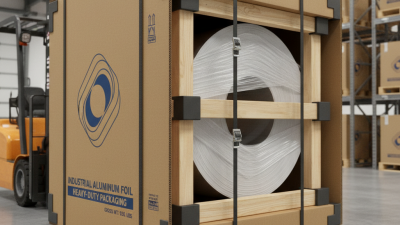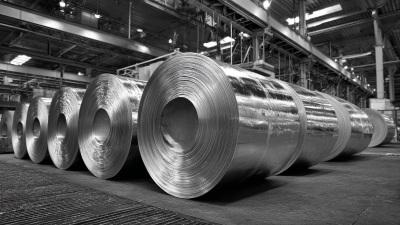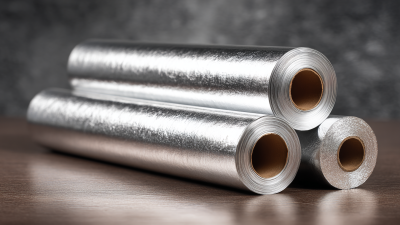Why Industrial Aluminum Foil Is Essential for Modern Packaging Solutions
The significance of industrial aluminum foil in contemporary packaging solutions cannot be overstated, as it plays a pivotal role in enhancing product preservation, safety, and sustainability. According to a report by Smithers Pira, the global market for aluminum foil is projected to reach approximately $33 billion by 2024, with industrial applications driving much of this growth. As industries increasingly prioritize packaging that is both efficient and environmentally friendly, industrial aluminum foil emerges as an essential material due to its versatility and superior barrier properties.
In sectors ranging from food and beverage to pharmaceuticals, industrial aluminum foil provides an excellent shield against moisture, light, and contamination, thereby extending shelf life and maintaining the integrity of products. The European Aluminium Foil Association (EAFA) highlights that aluminum foil can reduce food waste by up to 30% due to its ability to maintain food quality. Furthermore, the recyclability of aluminum contributes to a circular economy, aligning with consumers’ increasing demand for sustainable practices. As we delve into the "Top 5" reasons why industrial aluminum foil is indispensable, it becomes clear that this material not only meets the challenges of modern packaging but also supports industry-wide innovation and sustainability goals.

The Versatility of Industrial Aluminum Foil in Packaging Applications
Industrial aluminum foil has emerged as a critical component in modern packaging solutions due to its remarkable versatility. This lightweight material provides an exceptional barrier to light, air, and moisture, making it an ideal choice for preserving the freshness and quality of various products. Its ability to be easily customized in thickness and coating type allows manufacturers to tailor packaging to specific needs, ensuring optimal protection for everything from food items to pharmaceuticals.
Moreover, aluminum foil is not only functional but also environmentally friendly, as it is fully recyclable. Its durability ensures that it can withstand various environmental conditions during transportation and storage. The flexibility of aluminum foil allows for a range of packaging formats, from pouches and wraps to containers and labels, catering to diverse industries. In essence, industrial aluminum foil is not just a packaging material; it is a versatile solution that enhances product presentation while meeting the demands of sustainability and efficiency in today's market.
Why Industrial Aluminum Foil Is Essential for Modern Packaging Solutions
| Application Area | Advantages | Common Uses | Thickness Range (microns) |
|---|---|---|---|
| Food Packaging | Barrier protection, food preservation | Catering trays, snack wrappers | 9 - 20 |
| Pharmaceutical Packaging | Protection from moisture and light | Blister packs, foil wraps | 25 - 40 |
| Industrial Packaging | Durability, moisture resistance | Foil pouches, insulation | 50 - 100 |
| Cosmetics Packaging | Aesthetic appeal, protection | Cream tubes, sachets | 20 - 50 |
| Electronics Packaging | Static protection, shielding | Foil bags, conductive foil | 12 - 30 |
Key Properties of Aluminum Foil That Enhance Product Preservation
Aluminum foil has become an indispensable component in modern packaging solutions, owing to its key properties that significantly enhance product preservation. One of the most remarkable features of aluminum foil is its exceptional barrier protection against light, moisture, and oxygen. According to a report by MarketsandMarkets, the global aluminum foil packaging market is projected to reach USD 32.1 billion by 2025, highlighting its critical role in maintaining product quality. The foil's ability to create an impermeable seal ensures that food items remain fresh for longer periods, preventing spoilage and waste.
Moreover, aluminum foil is renowned for its lightweight nature combined with robust durability, making it an ideal choice for protective packaging. Research from the Aluminum Association indicates that the use of aluminum foil can extend the shelf life of perishable products by up to five times compared to other materials. This durability helps reduce costs for manufacturers and consumers alike while also promoting sustainability in packaging practices. As the demand for eco-friendly solutions rises, the recyclability of aluminum further solidifies its position as a preferred material in the packaging industry.
Sustainability and Efficiency: The Role of Aluminum Foil in Eco-Friendly Packaging
Aluminum foil has emerged as a critical player in the realm of eco-friendly packaging solutions, offering both sustainability and efficiency. According to a report by the Aluminum Association, over 75% of aluminum ever produced is still in use today, exemplifying its recyclability. This property not only reduces the demand for new raw materials but also significantly lowers the energy consumption required for production. In fact, recycling aluminum uses 95% less energy compared to producing new aluminum from bauxite, making it a smart choice for companies focused on environmental responsibility.
Moreover, aluminum foil's lightweight nature contributes to lower transportation emissions as less fuel is needed for shipping. Research indicates that packaging accounts for nearly 30% of global solid waste, with the need for efficient alternatives becoming increasingly urgent. By opting for aluminum foil packaging, businesses can not only enhance the shelf life of products—due to its excellent barrier properties against light, moisture, and air—but also align their operations with sustainable practices. In this way, aluminum foil serves as a pivotal element in modern packaging strategies, bridging the gap between efficiency and eco-consciousness.
Cost-Effectiveness of Aluminum Foil Compared to Alternative Packaging Materials
Aluminum foil has emerged as a vital component in modern packaging solutions due to its cost-effectiveness when compared to alternative materials like plastic and paper. One of the key advantages of aluminum foil is its durability and lightweight nature, which significantly reduces shipping costs, particularly in large-scale production. Unlike some plastic materials, aluminum foil is fully recyclable, adding to its appeal in a market increasingly concerned with sustainability. This dual benefit of cost savings and environmental responsibility positions aluminum foil as a leading choice for businesses looking to optimize their packaging strategies.
Moreover, the versatility of aluminum foil allows it to be tailored for various applications, from food packing to industrial uses. Its ability to provide an effective barrier against moisture, light, and air not only extends the shelf life of products but also enhances their quality. As industries move towards more efficient and sustainable packaging options, aluminum foil stands out as an economically viable solution, contributing to the overall growth of the packaging market. The ongoing innovations and improvements in aluminum foil production further bolster its position, making it a preferred choice among manufacturers seeking reliable and cost-effective packaging solutions.
Innovative Uses of Aluminum Foil in Food and Non-Food Industries
Aluminum foil plays a pivotal role in both food and non-food industries, offering a multitude of innovative applications that cater to modern packaging needs. In the food industry, aluminum foil is prized for its barrier properties, protecting products from moisture, light, and air. According to a report by Grand View Research, the global aluminum foil market size was valued at approximately $26.9 billion in 2022, with a significant portion of this demand driven by its use in food packaging. The lightweight yet durable nature of aluminum foil makes it ideal for keeping food fresh, while its recyclable properties align with growing consumer preferences for sustainable options.
Beyond food packaging, aluminum foil has emerged as a key player in non-food applications. The automotive and pharmaceutical sectors are increasingly utilizing aluminum foil for insulation and drug packaging, respectively. For instance, a study by Markets and Markets projected that the aluminum foil segment in the pharmaceutical sector would grow at a CAGR of 4.5% from 2020 to 2025. Its ability to maintain product integrity and prolong shelf life is critical in industries where precision and reliability are paramount. This versatility ensures that aluminum foil remains an essential component in innovative packaging solutions across various sectors.
Related Posts
-

5 Tips for Maxing Out the Benefits of Alu Foil in Your Kitchen
-

2025 Top 10 Industrial Aluminum Foil Products You Need to Know
-

Unlocking the Benefits of Aluminum Foil: Your Guide to Choosing the Right Supplier
-

The Surprising Science of Tin Foil: Uncovering Its Hidden Uses in Everyday Life
-

Innovative Uses of Aluminium Foil Paper for Food Packaging You Never Knew Existed
-

The Benefits of Using Aluminium Foil Paper for Safe and Sustainable Food Packaging
